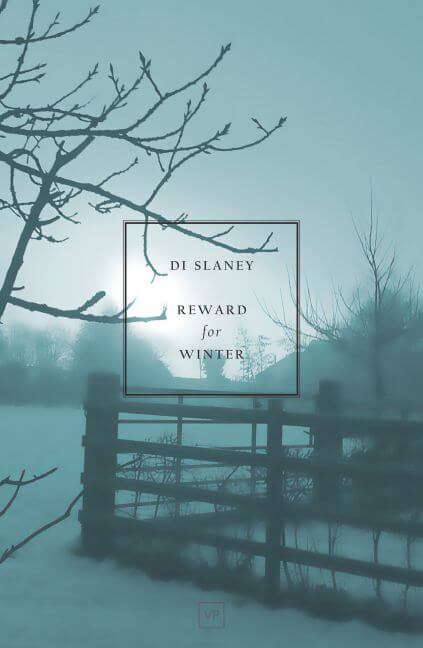Reading Di Slaney’s first full collection from Valley Press, I’m taken straight to where the smell and taste of outdoors makes time pass differently.
‘Every dawn she looks up, sucks on doing words
to break her fast, breathes in the day. So many
to roll around a mouth starved of soil’
But there’s work to do. How to Knit a Sheep (also the title of this first part of the collection) initiates us plainly.
Start with the legs. It helps to
grab a hoof before casting on, or
he might kick you off.
In this playful poem, which re-makes the shearing of a sheep, there’s so much accurate physicality and joy.
Tie the ends off tight
before you let him go, your nose to his
in thanks only eskimos understand.
It’s a poem about sheep, and it’s a poem about grace.
In 2005, Di Slaney left urban living for smallholding in Nottinghamshire, populating her acres with some 150 mostly rescued animals. ‘Reward for Winter’ is made in three parts, opening with How to Knit a Sheep – where vivid and finely crafted poems reflect the smallholder’s labours and discoveries. In Diptych, the poet delves into a sense of tenancy, of house and field inherited – ‘Fitting that this field/ returns, unharmed/ now that the deal is sealed,/ to where they farmed.’
There is sentiment, but no sense of sentimentality. This poem ends with a very 21st century acknowledgement of acquisition: ‘my greedy eyes fill up with green/ buying it back, borrowing a dream’.
Time is long, and cyclical in these poems, but slides between generations. In Doubtful Words, a beautifully made poem, one generation offers advice to another ‘counting down days till the hay is all/ gathered’. That almost forgotten sense of the year’s labour, and its contract with luck, health and weather is all here.
…Then we lie
fallow, cut off by the dark with nights slamming
like sashes, saving our tallow for Midwinter Eve,
the rut that restocks us, God willing, she said.
Yet modern woman’s urban norms do not escape Slaney’s forensic eye (title poem Reward for Winter). ‘For the first time in her adult life/ she allowed herself to sweat, to leave/ dust under her fingernails, to be/ imprecise.’
These poems sit well together, leading us back into the layers of the past and the labours of previous workers on this land, but all the while keeping one wary eye on who we are now, and the process of our becoming.
The second section of the book is a kind of biography of hen, divided again into neat egg boxes of poems which explore all the grit and parasites of henkeeping. With their often tight rhymes and specific vocabulary (augmented by notes in the back of the book) these poems are deceptively straightforward -based on Haynes’ ‘Chicken Manual’ – but can often be read into, as in the word-weaving Gular Flutter:
Stay and breathe. Fine to remember.
Calm will. Be everything just.
Perhaps my personal favourite part of this collection is the third – Bildr’s Thorpe. Here Slaney immerses the reader in the slippage between worlds, showing us the layers beneath the present day in this one particular place. In the poem Bildr’s Thorpe (like ‘a half-remembered hearth tale’), she viscerally inhabits the moment of a young man leaving home (later, her home):
He ran from the softness of straw and the comfort
of cattle. He ran because his mother called him
darling, kept him closer than the hounds…
Much research as well as feeling has gone into the making of these poems – Slaney’s preoccupation with a place and its different times is ingrained in them. I particularly enjoyed Their Letters, based on a Jacobean trial for adultery. As with some of the work in this collection, these are prose poems, tightly written, erotic, internally rhyming.
Her letter 1st May 1610
is pressed from flour-damp breast to Judas-hand Joanna,
hides in spinster folds to pass the Hall, makes its way first
to lips then nose, Peter eager for the hard-worked scent of
her, his Rose with lush, wide petals and soft sticky buds…
For all those who enjoy finely crafted poetry with a rural flavour, and a sense of history, this is a collection to savour and revisit. If you like hens as well, then you’ve really struck gold. And it’s also good to be able to say that Valley Press have created in ‘Reward for Winter’ a most handsome volume, with spacious layout and lushly wrap-around design and flapped cover.
This fine collection from Di Slaney introduces a skilful voice that is strong and flexible, with a fine ear for sound and a great capacity for imagery. And she is exploring something which has been mostly lost: our own intuitive connection to earth in this century, in this country.
Order your copy of Di Slaney’s Reward for Winter here: http://www.valleypressuk.com/book/15/reward_for_winter

